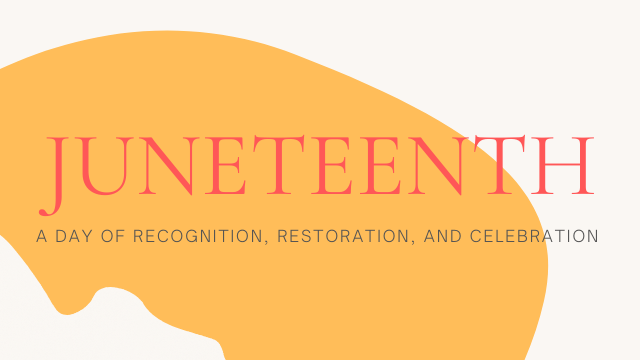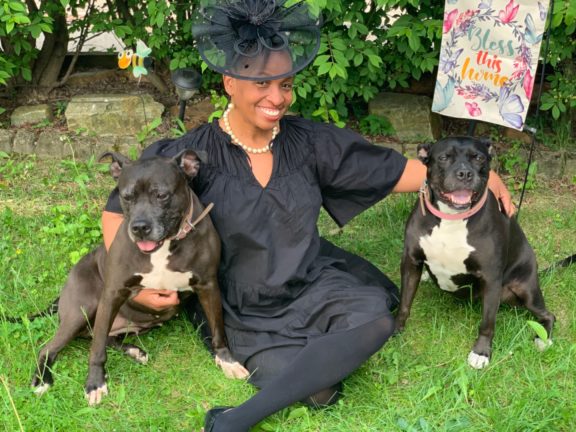
First celebrated in 1866, Juneteenth honors the news of the abolition of slavery reaching Texas in 1865. On Wednesday, June 16, 2021, Congress passed legislation to make Juneteenth a federal holiday. It’s the first federal holiday approved since Martin Luther King Jr. Day in 1983.
It is a myth that Quakers did not participate in the enslavement of others, but it is true that many Quakers voiced strong opposition to forced labor and chattel slavery, agitating for the laws to change. Grounded a belief in all people’s humanity and equality, Quakers like John Woolman, Paul Cuffe, Cyrus Bustill, Thomas Garrett, and Lucretia Mott served as key change-makers in the movement to abolish slavery. The Quaker Faith passed a minute that prohibited all Friends from owning enslaved persons in 1776. Friends today continue to work towards undoing racism.
This year’s Annual Sessions theme focuses on this work, “Uproot Injustice, Root Justice.” The theme will be present and woven into all aspects of our work together.
Celebrating Juneteenth Growing Up
Dr. tonya thames taylor is a professor of history at West Chester University and a member of Fallowfield Monthly Meeting. tonya brings us her memories of growing up with Juneteenth as a big, community-wide celebration. She describes the power and significance of celebrating this holiday in Biloxi, Mississippi:

I always say, ‘I was born and came of age in the coastal city of Gulfport, Mississippi.’ I enjoyed celebrating Juneteenth in the neighboring city of Biloxi.
I thought that everybody celebrated Mardi Gras and Juneteenth because that is what I grew up with. Gulfport is close to New Orleans (so) that’s why we celebrated Mardi Gras. New Orleans is known for its spontaneous celebrations; on a nice day, it is not uncommon to see people having a barbecue in the streets or start a second line that is full of music.
We were influenced by French culture but I was also surrounded by traditional American culture.
The celebration of Juneteenth, which was founded in history, was always a part of my life…I grew up knowing what that day was. In fact, when I was in school if you asked any of my classmates, we knew…“black people got their freedom with Juneteenth.”
This was the day that: we learned that black people stopped being forced to work, (and) they told us what slavery was (forced labor). But there were celebrations with all-day events. They would be held…at the largest school, in a stadium, like it was a Super Bowl event. During the…celebrations, they didn’t focus on slavery. They talked about the contributions that black people made. They shared stories about how black people built America.
Juneteenth influenced who I am as a person. I’ve always felt that America was my country, (and) that my ancestors built this country, because of my knowledge of Juneteenth.
My most memorable Juneteenth event was learning about the Black jockeys at the Kentucky Derby. Black jockeys were the first people who won the Kentucky Derby! It wasn’t until segregation happened that black people stopped participating in the Derby.
As a kid, imagine realizing that Derby Day was initially grounded in the Black tradition…not only that the black people were jockeys, but they also kept the horses and…were a part of that culture. We were celebrating our genius by recognizing our contributions. Maybe they didn’t have enough money to own a horse, but they had the command of a horse. I grew up learning about horsepower and knowing that I was a part of a group of people who could harness the power of horses to win or race. That gave me a sense of pride and confidence in my abilities as a person.
When I came into the universe outside of this ecosystem, I knew I carried the beautiful weight of it. I was supposed to contribute so those coming behind me could benefit. Every child needs a Juneteenth.
The beautiful reality about Juneteenth is that we didn’t ask for permission to have it. I’ve been celebrating Juneteenth every year since I can remember. I don’t know life without it. So America is just catching up to it. And that includes Black Americans, particularly those who did not grow up Southern (and those whose) families forgot the Juneteenth tradition.
Juneteenth at Historic Fair Hill – A Quaker activity for all ages
This Saturday, the Quaker burial ground and community outreach/literacy project are offering a free outdoor Juneteenth play in partnership with the Beacon Theatre Productions.
Historic Fair Hill is featuring Jo Ann Robinson because she was “the powerhouse behind the Montgomery, Alabama, Bus Boycott, working with both Rosa Parks and Martin Luther King, Jr.” An organizer, author, and college professor, Jo Ann was a persistent leader who partnered with local activists in pushing the city of Montgomery towards overturning segregation.
Authored by Terri Lyons, the play also features Terri in the role of Jo Ann Robinson, with Angela Cooper performing the role of an interviewer.
Anthony Stover, clerk of PYM’s Quaker Life Council, will be making opening remarks at 1:30, followed by a 2:00 tour of 19th-century Abolition murals led by Historic Fair Hill’s (HFH) educator, Carolyn Singleton.
A garden tour with Tito Caba (HFH farmer/gardener) will center on the crops planted and grown by the African diaspora.
At 3:00, the play will be performed. Should the weather turn wet, the performance will be moved into the St. John Memorial Church, across the street.
Resources
- What Is Juneteenth?
- PYM Peace and Social Justice
- PYM AntiRacism Collaborative
- Honor Emancipation by Celebrating Juneteenth by Emily Blanck, a member of Mickleton Meeting
- DEI Faculty Research Spotlight: Remembering Emancipation, Juneteenth as America’s Emancipation Holiday
- Juneteenth Resources, National Constitution Center
- 14 Children’s Books celebrating Juneteenth